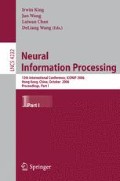Abstract
The purpose of this study is to investigate the cortical areas involved in comprehending Korean regular and irregular verb Eojeols. Eojeols is the specific spacing unit of a sentence which is bigger than a word but smaller than phrase. This study showed that there is a distinction between the process and representation of regularly and irregularly inflected verbs in Korean using neuroimaging and hehavioral method.
Access this chapter
Tax calculation will be finalised at checkout
Purchases are for personal use only
Preview
Unable to display preview. Download preview PDF.
References
Taft, M.: Interactive activation as a framework for understanding morphological processing. Language and Cognitive Processes 9, 271–294 (1994)
Taft, M., Forster, K.I.: Lexical storage and retrieval of prefixed words. Journal of Verbal Learning and Verbal Behavior 14, 638–647 (1975)
Henderson, L., Wallis, J., Knight, D.: Morphemic structure and lexical access. In: Bouma, H., Bowhuis, D.G. (eds.) Attention and performance X, pp. 211–226. Erlbaum, London (1984)
Butterworth, B.: Lexical representation. In: Butterworth, B. (ed.) Language Production, Development, Writing and Other Language Process, vol. 2, pp. 257–294. Academic Press, London (1983)
McClelland, J.L., Rumelhart, D.E.: An interactive activation model of context effects in letter perception, Part 1. An account of basic findings. Psychological Review 88, 375–405 (1981)
Caramazza, A., Laudanna, A., Romani, C.: Lexical access and inflectional morphology. Cognition 28, 297–332 (1988)
Baayen, H., Schreuder, R.: War and peace: Morphemes and full forms in a Noninteractive Activation Parallel Dual-Route Model. Brain and Language 68, 27–32 (1999)
Pinker, S., Ullman, M.T.: The past and future of the past tense. Trends in Cognitive Sciences 6(11), 456–463 (2002)
Marselen-Wilson, W.D., Tyer, L.K.: Rules, representation, and the English past tense. Trends in Cognitive Sciences 2, 428–435 (1998)
McClelland, J.L., Patterson, K.: Rules or connections in past-tense inflections: what does the evidence rule out? Trends in Cognitive Sciences 6(11), 465–472 (2002)
Dalal, R.H., Loeb, D.F.: Imitative production of regular past tense -ed by English-speaking shildren with specific language impairment. International Journal of Language and Communication Disorders 40(1), 67–82 (2005)
Dhond, R.P., Marinkovic, K., Dale, A.M., Witzel, T., Halgren, E.: Spatiotemporal maps of pasttense verb inflection. Neuroimage 19, 91–100 (2003)
Gernsbacher, M.A.: Resolving twenty years of inconsistent interactions between lexical familiarity and orthography, concreteness, and polysemy. Journal of Experimental Psychology: General 113, 256–281 (1984)
Park, T., Kim, M., Park, J.: Subjective frequency estimates of Korean words and its effect on lexical decision. In: 2003 Spring Conference of The Korean Society for Cognitive Science, pp. 141–146 (2003)
Yoon, H.W., Cho, K.-D., Park, H.W.: Brain Activation of Reading Korean Words and Recognizing Pictures by Korean Native Speakers: a Functional Magnetic Resonance Imaging Study. International Journal of Neuroscience 115, 757–768 (2005)
Yoon, H.W., Cho, K.-D., Chung, J.-Y., Park, H.W.: Neural mechanisms of Korean wrod reading: a functional magnetic resonance imaging study. Neuroscience Letters 373, 206–211 (2005)
Kim, M., Krick, C., Reith, W.: The Korean Writing “Hangul” and its Cerebral Organization. An fMRI Study. Klinische Neurophysiologie 35(3) (2004)
Brown, C.M., Hagoort, P.: The Neurocognition of Language. Oxford University Press, Oxford (1999)
Khader, P., Burke, M., Bien, S., Ranganath, C., Rosler, F.: Content-specific activation during associative long-term memory retrieval. Neuroimage 27, 805–816 (2005)
Grabowski, T.J., Damasio, H., Damasio, A.R.: Premotor and Prefrontal Correlates of Category- Related Lexical Retrieval. Neuroimage 7, 232–243 (1998)
Pulvermüller, F.: Brain reflections of words and their meaning. Trends in Cognitive Sciences 5(12), 517–524 (2001)
Cohen, L., Dehaene, S., Naccache, L., et al.: The visual word form area: spatial and temporal characterization of an initial stage of reading in normal subjects and posterior split-brain patients. Brain 123, 291–307 (2000)
Heim, S., Alter, K., Ischebeck, A.K., et al.: The role of the left Brodmann’s areas 44 and 45 in reading words and pseudowords. Cognitive Brain Research 25, 982–993 (2005)
Talairach, J., Tournoux, P.: Co-planar stereotaxic atlas of the human brain. Thieme, New York (1998)
Author information
Authors and Affiliations
Editor information
Editors and Affiliations
Rights and permissions
Copyright information
© 2006 Springer-Verlag Berlin Heidelberg
About this paper
Cite this paper
Yim, H., Park, C., Lim, H., Nam, K. (2006). Mental Representation and Processing Involved in Comprehending Korean Regular and Irregular Verb Eojeols: An fMRI and Reaction Time Study. In: King, I., Wang, J., Chan, LW., Wang, D. (eds) Neural Information Processing. ICONIP 2006. Lecture Notes in Computer Science, vol 4232. Springer, Berlin, Heidelberg. https://doi.org/10.1007/11893028_28
Download citation
DOI: https://doi.org/10.1007/11893028_28
Publisher Name: Springer, Berlin, Heidelberg
Print ISBN: 978-3-540-46479-2
Online ISBN: 978-3-540-46480-8
eBook Packages: Computer ScienceComputer Science (R0)

